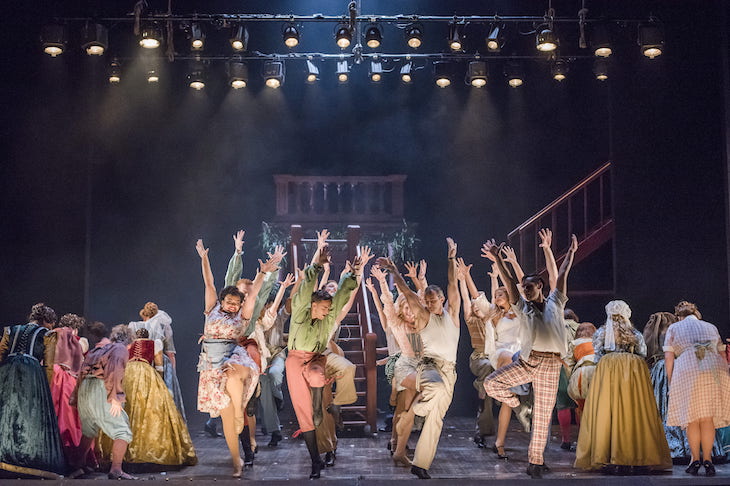Listen to the crowd. I often delay passing judgment on a show until the audience delivers its verdict. This is especially true of plays that appeal primarily to women. Genesis Inc. by Jemma Kennedy presents us with two infertile mums. Serena is a clingy worrier whose aloof boyfriend, Jeff, resents forking out thousands for IVF. Bridget, a cocky City power-dresser, is keen to get herself impregnated by her gay best friend. Serena and Bridget don’t meet until the final scene so the play feels like two separate dramas, poorly merged. The fertility clinic, Genesis Inc., is owned by the smarmy Dr Marshall (Harry Enfield). He wants the firm to go public so he hires one of his customers, cocky Bridget, to handle the flotation. ‘Conflict of interest,’ muttered my inner financial regulator. Already badly planned, the script wanders off into a mass of sub-narratives. Bridget’s gay friend tries to seduce a camp Catholic priest. Jeff has a fling with his yoga-teaching ex, who encourages her pupils to ‘bring their sufferings to the mat’. A social worker by trade, Jeff tries to persuade a battered wife, Sharon, to abandon her violent husband. Though irrelevant to the IVF theme, Sharon is a glorious creation. She’s a hard-smoking cockney cynic who bribes her husband not to beat her (‘it’s my money’), and believes that special educational needs are a hoax perpetrated by middle-class snobs to avoid admitting that their kids ‘are thick’. Clare Perkins (superb as Sharon) doubles as a gutsy Australian stockbroker who ascribes her success to ‘me snapper’. More narrative deviations appear. The writer keeps gathering up her characters like puppets and slotting them into odd-ball Monty Python routines. We meet Karl Marx, Susan Sontag, God, Abraham, a ‘talking vagina’ and other caricatures.
It’s unwise to shove surreal satire into a realistic drama because the comedy bits need to be ten times funnier than the material they’re interrupting. These sketches fall short. Did the writer lack faith in her characters, or in her art? The star, Harry Enfield, is terrific value although the role of Dr Marshall is barely a walk-on. Doubling as Karl Marx, Enfield improvised brilliantly on press night when his whiskers became detached from his face. But his contribution is minor and he generously hands the top honours to comedy chameleon Clare Perkins. Despite the play’s faults, there are touches of tremendous skill in the writing, and the production delivers at least 15 laugh-out-loud moments.
Potentially, the audience is enormous. Many millions have experienced the grim uncertainties of IVF and they’d pay good money to see a drama that blends anguish and comedy, as this attempts to do. Structural wonkiness wouldn’t bother them. Might this show prove a winner? Towards the end I was fairly sure that the crowd would give the play a thumbs-down butI had to wait while the final scenes dragged on and on. Then Bridget’s gay pal said, ‘I’ve written a song about you.’ Another three minutes to sit through. But the number was sweetly done and it brought the ramshackle story together and delivered a happy, feelgood ending.
Then the applause. I swivelled in my seat to check the decisive factor: how many were standing up. Ten or 20, in a smallish venue like this, would indicate that the show had real emotional power. But no one stood. A pensioner in the row ahead of me was scrolling through his smartphone, not even pretending to clap. Given that he was near the front, in full view of the actors, this was more than a little rude. He may not have realised that the performers scrutinise the press-night crowd with expert eyes as the applause begins. They’re looking for more than enthusiasm. Far more. Pockets of ecstasy should be breaking out all over. Here the response was perfunctory and the actors trooped off looking glum. It would take a miracle for this show to transfer. Then again, IVF is all about miracles.
I went to Kiss Me, Kate as a virgin. In advance, I knew nothing except that this is a Cole Porter adaptation of The Taming of the Shrew. I was curious to see how Broadway would handle Petruchio’s sadistic brutality towards Kate. Answer: it’s avoided. She enters as a rebellious bruiser who screams at every man she meets. When she reappears, she’s a defeated skivvy preaching the joys of subservience. The trick is that the show is a backstage drama in which two warring ex-lovers are forced to partner up in a Shakespeare revival.
The music is extraordinarily powerful and it seems to articulate all the self-confidence, strength and freedom of post-war America. Best moment, ‘Brush Up Your Shakespeare’, performed by John Savournin and Joseph Shovelton. One short, one tall. They’re like John Cleese standing next to a bollard.







Comments